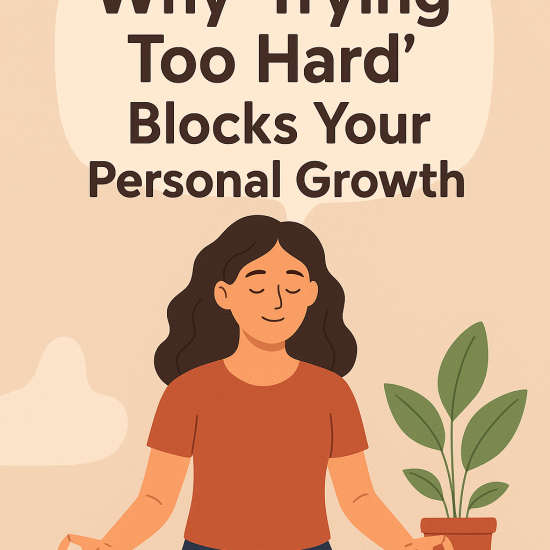Have you ever set a big goal, taken the first step, and then suddenly lost momentum? You might find yourself procrastinating, doubting your ability, or giving up just before reaching the finish line. If that sounds familiar, you’re not alone. What you’re experiencing is known as self-sabotage, and it runs deeper than just poor time management or lack of willpower.
At its core, self-sabotage stems from deep-seated limiting beliefs, often developed in childhood. These beliefs quietly influence your behavior and block your success, confidence, and happiness.
But here’s the good news: self-sabotage is not permanent. With the right tools, guidance, and support, especially from a trained life coach or confidence coach, you can break the cycle, heal your mindset, and move forward with purpose.
What Is Self-Sabotage?
Self-sabotage occurs when your actions (or inactions) interfere with your goals, desires, or values. It’s not always obvious. Sometimes, it’s skipping important tasks. Other times, it’s overcommitting, seeking perfection, or avoiding decisions altogether.
Common forms of self-sabotage include:
- Procrastination
- Fear of failure or success
- Overthinking and indecision
- Comparing yourself to others
- Quitting projects prematurely
- Negative self-talk
- Self-doubt in new opportunities
On the surface, these behaviors seem random. But they’re often rooted in learned emotional responses formed during your earliest experiences.
The Behavioral Psychology Behind Self-Sabotage
According to behavioral psychology, we operate from subconscious belief systems that guide our actions. These beliefs are often the result of repeated patterns, conditioning, or trauma. In childhood, your brain made meaning of the world based on how you were treated and what you were told.
If you heard or internalized messages like:
- “You’re only lovable when you achieve.”
- “Don’t speak up someone will always criticize you.”
- “You’re not smart enough.”
- “Good things don’t last.”
You likely developed unconscious beliefs that drive self-sabotaging behaviors today. These beliefs operate behind the scenes, silently determining what you feel safe pursuing.
Even when you consciously want success or change, your subconscious may see it as a threat, and that’s when sabotage kicks in.
Limiting Beliefs Formed in Childhood
Childhood is a critical time for emotional development. During those early years, we develop beliefs about ourselves, others, and the world. These core beliefs act like programming, running silently in the background and influencing how we react to life.
Some common limiting beliefs include:
- “I’m not good enough.”
- “If I try, I’ll fail.”
- “Success will lead to rejection or pressure.”
- “I must stay small to stay safe.”
These beliefs often show up as hesitation, fear, or self-judgment. And until they are acknowledged and transformed, they can block even the most determined effort.
How Self-Sabotage Impacts Your Confidence
When you repeatedly hold yourself back, it damages your trust in yourself. You begin to expect failure. You question your ability to follow through. And worst of all, you start identifying with the sabotage: “Maybe I’m just lazy.” “Maybe I don’t deserve more.”
This mindset doesn’t just affect personal goals it can limit career growth, relationships, and your overall sense of purpose.
That’s where working with a confidence coach or life coach can be life-changing.
How Life Coaching Helps Break the Cycle
A life coach helps you identify your patterns, interrupt the cycle, and consciously create new beliefs and behaviors. Coaching offers tools, structure, and emotional support—not just for setting goals, but for overcoming the mental roadblocks that get in the way.
Let’s look at how coaching helps in a practical, transformative way:
1. Identifying the Root Cause
A good coach doesn’t just look at your behaviors they help you explore why those behaviors exist. Together, you’ll uncover the hidden fears and limiting beliefs driving your actions.
For example, you may realize that your tendency to quit early comes from a childhood belief that “trying hard and still failing means I’m a failure.” By recognizing this pattern, you create the power to choose differently.
2. Reframing Negative Thought Patterns
Negative self-talk fuels sabotage. “I can’t do this.” “They’re better than me.” “Why even try?”
Coaches help you catch these thoughts and reframe them into empowering language. Instead of “I always mess things up,” you learn to say, “I’m learning and growing I don’t need to be perfect.”
This reprogramming is essential for building self-confidence.
3. Strengthening Emotional Resilience
A coach helps you develop the ability to face fear, uncertainty, and failure without shutting down. You begin to see setbacks as data, not proof of your unworthiness.
With greater emotional resilience, you’ll feel safer stepping into new opportunities and taking healthy risks.
4. Creating Self-Compassionate Accountability
One powerful reason coaching works is that it combines accountability with compassion. Unlike harsh self-discipline or self-criticism, coaching holds space for your humanity. You’re supported through the ups and downs, without judgment.
This approach makes you more likely to stay consistent and grow from mistakes rather than giving up when things get hard.
5. Building Confidence Through Aligned Action
Confidence isn’t something you magically “get” it’s built through taking aligned, intentional action. A confidence coach helps you design actions that align with your values and stretch you just enough to grow, without overwhelming you.
Each time you follow through, you strengthen your belief in yourself. And with support, you’re more likely to keep going.
Real-Life Example: From Self-Doubt to Self-Trust
Anaya, a 32-year-old marketing professional, came to coaching feeling stuck. She wanted to start her own creative agency but kept delaying the launch. Every time she made progress, she would suddenly second-guess everything and stop.
Through life coaching, Anaya discovered her fear of success was rooted in childhood pressure to be “perfect.” Her subconscious believed that success would bring burnout, criticism, or failure.
Her coach helped her reframe success as sustainable and joyful. Together, they created a launch plan with manageable steps, and she practiced saying no to perfectionism. With each small success, her confidence grew.
Today, Anaya runs a thriving creative business, and for the first time, she feels free to succeed on her own terms.
The Role of a Confidence Coach
While life coaches address a broad range of goals and mindsets, a confidence coach specifically helps you:
- Identify and overcome self-doubt
- Speak up with authenticity
- Set boundaries without guilt
- Own your voice and value
- Take bold action even when afraid
This kind of support is especially powerful if you struggle with visibility, self-expression, or shrinking your voice to avoid conflict or criticism.
Why Coaching Works (When Willpower Doesn’t)
Self-sabotage is not a behavior issue it’s an identity issue. You can’t willpower your way out of a belief system that doesn’t support your growth.
A coach helps you change your internal narrative. They reflect your strengths, challenge your false stories, and support you as you take real, meaningful action toward becoming who you want to be.
And unlike self-help books or online advice, coaching is personalized to your experiences, emotions, and goals.
Is It Time to Break the Cycle?
You don’t need more motivation. You don’t need to “try harder.”
What you need is a safe space to explore what’s holding you back and the right tools to move forward.
At Loa Mayi, our life coaching and confidence coaching services are designed to help you stop self-sabotage at the root. We walk beside you as you shift your mindset, rebuild trust in yourself, and step into the life you’re meant for.
You’re Not Broken You’re Becoming
Self-sabotage isn’t who you are; it’s a pattern you learned. And with the right support, it’s a pattern you can unlearn.
Life coaching gives you the mindset, structure, and emotional safety to stop fighting yourself and start living from your full potential.
Confidence coaching empowers you to trust your voice, value your progress, and take ownership of your story.
You are not behind. You are not failing. You’re growing. And now, you’re ready to grow with support.
Visit https://loamayi.com to begin your coaching journey today.





